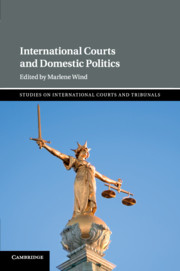Book contents
- International Courts and Domestic Politics
- Studies on International Courts and Tribunals
- International Courts and Domestic Politics
- Copyright page
- Contents
- Figures
- Tables
- Contributors
- Abbreviations
- Preface
- Introduction
- 1 ‘Missing in Action? The Rare Voice of International Courts in Domestic Politics’
- Part I
- Part II
- 8 Ideology and International Human Rights Commitments in Post-Communist Regimes: The Cases of the Czech Republic and Slovakia
- 9 Escalation and Interaction: International Courts and Domestic Politics in the Law of State Immunity
- 10 National Parliaments: Obstacles or Aid to the Impact of International Human Rights Bodies?
- 11 The European Court of Human Rights and Swiss Politics: How Does the Swiss Judge Fit In?
- 12 The Use of International Jurisprudence by Israel’s Supreme Court
- 13 Laggards or Pioneers? When Scandinavian Avant-garde Judges Do Not Cite International Case Law: A Methodological Framework
- Index
- References
10 - National Parliaments: Obstacles or Aid to the Impact of International Human Rights Bodies?
from Part II
Published online by Cambridge University Press: 23 June 2018
- International Courts and Domestic Politics
- Studies on International Courts and Tribunals
- International Courts and Domestic Politics
- Copyright page
- Contents
- Figures
- Tables
- Contributors
- Abbreviations
- Preface
- Introduction
- 1 ‘Missing in Action? The Rare Voice of International Courts in Domestic Politics’
- Part I
- Part II
- 8 Ideology and International Human Rights Commitments in Post-Communist Regimes: The Cases of the Czech Republic and Slovakia
- 9 Escalation and Interaction: International Courts and Domestic Politics in the Law of State Immunity
- 10 National Parliaments: Obstacles or Aid to the Impact of International Human Rights Bodies?
- 11 The European Court of Human Rights and Swiss Politics: How Does the Swiss Judge Fit In?
- 12 The Use of International Jurisprudence by Israel’s Supreme Court
- 13 Laggards or Pioneers? When Scandinavian Avant-garde Judges Do Not Cite International Case Law: A Methodological Framework
- Index
- References
Summary
This chapter argues that parliaments are an important actor facilitating the realisation of human rights. It shows that some recommendations of UN human rights treaty bodies (COs) have been effective and resulted in change as a result of the efforts of Members of Parliament (MPs) in the Netherlands, New Zealand and Finland. Nonetheless, parliaments can also pose an obstacle to the implementation of international human rights and COs. A wide parliamentary consensus on a certain practice is sometimes used as a simple excuse (by the government) for not acting upon the recommendations put forward in the COs. At the same time, MPs can be self-righteous and critical about the quality of UN human rights treaty bodies and hence argue against the implementation of COs. The last part of this chapter presents a tentative list of domestic variables conditioning the (difference) in the engagement of parliaments with COs.
- Type
- Chapter
- Information
- International Courts and Domestic Politics , pp. 227 - 261Publisher: Cambridge University PressPrint publication year: 2018
References
- 4
- Cited by

